|
|
|
Sort Order |
|
|
|
Items / Page
|
|
|
|
|
|
|
| Srl | Item |
| 1 |
ID:
168266
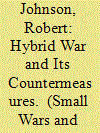

|
|
|
|
|
| Summary/Abstract |
This article examines critically the literature of hybrid war and evaluates the countermeasures often proposed. It explains the concept of hybrid warfare and its varied interpretations, illustrating how it is a manifestation of current anxieties in armed conflict. The selection of the literature is based on works that are referenced, that offer a scientific approach, and which review either the phenomenon of hybrid warfare or its countermeasures empirically. Unscientific works have been omitted. The analysis of the literature presented here shows that the antidotes to ‘hybridity’ lie not in the operational or tactical sphere but in strategic and political domains.
|
|
|
|
|
|
|
|
|
|
|
|
|
|
|
|
| 2 |
ID:
094646
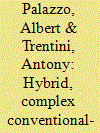

|
|
|
| 3 |
ID:
105125
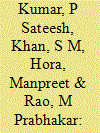

|
|
|
|
|
| Publication |
2011.
|
| Summary/Abstract |
The Indian Protection of Plant Varieties and Farmers' Rights (PPV&FR) Act is now a decade old and PPV&FR implementation implications are now clearly visible. The shortcomings and inadequacies in implementation of the Act and the Rules are a matter of grave concern to the seed industry, in particular, and Indian agriculture, in general. This needs to be addressed and resolved by the Central Government and the PPV&FR Authority in order to meet the objectives enshrined in the Act. These inadequacies are perceived in terms of slow-moving approach for database maintenance of existing varieties, notification of crop species eligible for registration, duration and effect of registration of extant notified varieties and varieties of common knowledge, ambiguity in parent line and hybrid registration under new variety and/or extant variety category, powers of the Registrar, advertisements published in Plant Variety journals, registration of transgenic varieties, parent lines etc. This paper highlights the issues that need to be resolved to avoid misuse of the Act and thereby unwarranted litigations.
|
|
|
|
|
|
|
|
|
|
|
|
|
|
|
|
| 4 |
ID:
190775
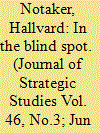

|
|
|
|
|
| Summary/Abstract |
Situational awareness in the face of hybrid campaigns is undermined by ‘blind spots’, which this article conceptualises. Blind spots are where legal or political frameworks preclude intelligence gathering below the threshold of war. Drawing on a historical case study of alterations in legislation and security police directives in Norway from 1950–2021, the analysis shows how an influence operation’s blind spot varied along with shifts in the balance between national security concerns and democratic individual rights. Recent initiatives to criminalise domestic collaboration with foreign influence operators are discussed, and the advent of AI and microtargeting presented as a challenge out of reach of such legislation.
|
|
|
|
|
|
|
|
|
|
|
|
|
|
|
|
| 5 |
ID:
086232
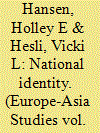

|
|
|
|
|
| Publication |
2009.
|
| Summary/Abstract |
We challenge the civic-ethnic dichotomy drawn by previous authors and propose a four-category typology of identities based on out-group tolerance and in-group attachment. Drawing from work on national identity formation and nation-building, we test hypotheses about the processes that cause individuals to adopt one identity over others using survey data based on representative samples of five ethnic groups in Ukraine. We find that the effects of socialisation processes vary greatly depending upon ethnic group. Our results challenge some long-held assumptions about the potential destabilising effects of 'ethnic' identities and the degree to which 'civic' identities correspond to values and behaviours supportive of democracy.
|
|
|
|
|
|
|
|
|
|
|
|
|
|
|
|
| 6 |
ID:
168964
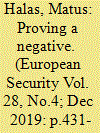

|
|
|
|
|
| Summary/Abstract |
The increased Russian foreign policy assertiveness and the related security concerns associated with the Eastern Flank of NATO caused a revival of interest in European deterrence after more than two decades of neglect. Yet the absence of a military invasion into the Baltics does not necessarily imply a successful deterrent threat. Quite the contrary: a detailed analysis using Boolean logic suggests that deterrence does not really work in the Baltics, neither at the conventional, nor at the sub-conventional level. A lack of capabilities undermines the credibility of NATO’s conventional deterrence posture despite its clear effort to communicate the threat to the other side. The only reason why the lack of capabilities on the Eastern Flank has no negative consequences for the Alliance is because Russia has (currently) no need to advance its state interests by resorting to military force. At the same time, deterrence fails repeatedly at the sub-conventional level and it will probably continue to fail in the future. Incidents like the relocation of the Bronze Soldier Memorial in 2007, the kidnapping of a security officer in 2014 or the violations of airspace in 2018 can escalate to a full-blown crisis. Limiting the number of such incidents should be the main goal of the cumulative deterrence of hybrid threats.
|
|
|
|
|
|
|
|
|
|
|
|
|
|
|
|
| 7 |
ID:
159148
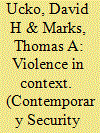

|
|
|
|
|
| Summary/Abstract |
The malaise that the United States, and the West, have experienced in recent campaigns stems in large part from unclear thinking about war, its political essence, and the strategies needed to join the two. Instead, analysis and response are predicated on entrenched theoretical concepts with limited practical utility. The inadequacy of understanding has spawned new, and not so new, terms to capture unanticipated trends, starting with the re-discovery of “insurgency” and “counterinsurgency” and leading to discussion of “hybrid threats” and “gray-zone” operations. New terminology can help, but the change must go deeper. Challenging analytical orthodoxy, this article sets out a unifying approach for the study of political violence, or more accurately: violent politics. It provides a conceptual foundation that helps to make sense of recent shifts in warfare. In effect, it offers sorely needed theoretical insights into the nature of strategy and guides the process of responding to nontraditional threats.
|
|
|
|
|
|
|
|
|
|
|
|
|
|
|
|
| 8 |
ID:
180513
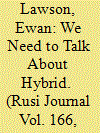

|
|
|
|
|
| Summary/Abstract |
Hybrid warfare has been an important topic in much of Western national security discourse in the past five years, albeit with many different labels. The concept is problematic in that it can be applied to a range of activities that, while coercive, might have been considered part of routine statecraft and has been applied to a range of contexts where the actual activities being described are quite different. In this article, Ewan Lawson discusses how the concept of hybrid warfare is important for policymakers as it reinforces the idea that conflict and competition should not be seen through a simple peace–war dichotomy. It also highlights the importance of a whole-of-government response and the risk of seeing it through a purely military prism.
|
|
|
|
|
|
|
|
|
|
|
|
|
|
|
|
|
|
|
|
|